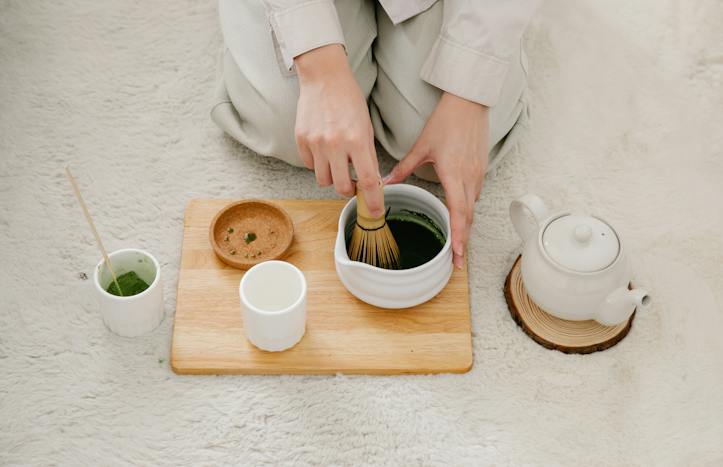Matcha Tea Intermittent Fasting: Enhancing Your Health Journey
When exploring the benefits of matcha tea intermittent fasting, one may discover a synergistic effect that promotes wellness. This ancient Japanese tea, when paired with the modern fasting method, offers a unique approach to health and vitality.
The Intersection of Matcha Tea and Intermittent Fasting
Intermittent fasting (IF) is a dietary pattern that cycles between periods of eating and fasting. It has gained popularity due to its potential health benefits which include weight loss, improved metabolic health, and even a longer lifespan. Matcha tea, with its rich history and health benefits, has become a favored beverage among those who practice intermittent fasting.
Understanding Matcha Tea
Matcha is a finely ground powder made from specially grown and processed green tea leaves. It is known for its vibrant green color and has a unique nutrient profile because it is consumed entirely, not just brewed from the leaves. This means that matcha drinkers receive a higher concentration of antioxidants, vitamins, and minerals than they would from other teas.
Matcha Tea: A Fasting Friend
One of the primary challenges of intermittent fasting is managing hunger pangs during fasting periods. Matcha tea can be an excellent ally here. The presence of the amino acid L-theanine in matcha promotes relaxation and helps to curb appetite, making fasting periods more manageable.
Boosting Metabolism with Matcha
Matcha tea has been shown to increase thermogenesis, the body’s rate of burning calories, which can be advantageous during intermittent fasting. Not only does it help to maintain energy levels, but it can also accelerate weight loss efforts by boosting metabolism.
Integrating Matcha Tea Into Your Fasting Routine
To incorporate matcha tea into your intermittent fasting routine, consider starting your day with a cup of matcha during your fasting period. This can help to kickstart your metabolism while keeping you satiated. It’s also important to choose high-quality, ceremonial-grade matcha to ensure you are getting the best flavor and nutrient profile.
Matcha and Autophagy
Intermittent fasting is known to initiate autophagy, a process where cells self-cleanse and remove damaged components. The antioxidants in matcha may support this process, providing a cellular “tune-up” that can lead to improved overall health.
Preparing the Perfect Cup of Matcha
For optimal benefits, matcha should be prepared traditionally, using a bamboo whisk to blend the matcha powder with hot water until a frothy beverage is achieved. This method ensures that the powder is fully dispersed and releases its full range of nutrients.
While intermittent fasting, it is essential to stay hydrated. Matcha tea not only contributes to your daily fluid intake but also provides a host of nutrients without breaking your fast. This makes it an ideal drink for both fasting and non-fasting windows.
Considerations for Matcha Tea Intermittent Fasting
Although matcha tea and intermittent fasting are generally considered safe, it’s essential to listen to your body and make adjustments as needed. Those with certain medical conditions or who are pregnant should consult with a healthcare professional before starting any new dietary regimen.
In conclusion, matcha tea intermittent fasting offers a unique combination of ancient tradition and modern health practice. By integrating matcha into your fasting routine, you may enhance your health journey, experiencing increased mental clarity, weight management, and overall wellness.
Discover how matcha tea intermittent fasting can elevate your health with its antioxidants, appetite control, and metabolic benefits.
Recent Posts
- Understanding the Discontinuation of White Yogi Healthy Fasting Tea
- Fasting Tea Benefits: What Happened to White Yogi Healthy Tea?
- Fasting Tea Benefits: What Happened to White Yogi Healthy Brand?
- Fasting Tea Benefits: Before White Yogi Tea’s Discontinuation
- Fasting Tea Benefits: What Happens When Discontinued?
- Fasting Tea Benefits: Exploring Alternatives to White Yogi Healthy Fasting Tea
- Understanding the Discontinuation of White Yogi Healthy Fasting Tea
- Fasting Tea Benefits: What Happened to White Yogi Healthy Blend?
- Fasting Tea Benefits: A White Yogi’s Perspective
- Fasting Tea: Understanding the Discontinuation of White Yogi Healthy Blend
External articles
Yes. Matcha green tea is full of antioxidants that increase your body's level of cholecystokinin (CCK) — a hunger suppressing hormone that also helps trigger the digestion of proteins and fats.
From matcha to herbal, here's advice from registered dietitians about whether you can drink tea while intermittent fasting. Intermittent fasting and tea The goal of intermittent fasting is to inspire the body to " metabolically switch ," according to a 2019 study published in The New England Journal of Medicine.
As the name suggests, intermittent fasting (IF) is a dietary regimen comprised of a set eating window and fasting window of time. The main rule is to limit all calorie-containing food or drinks during the fasting window while eating as usual during the eating window.
